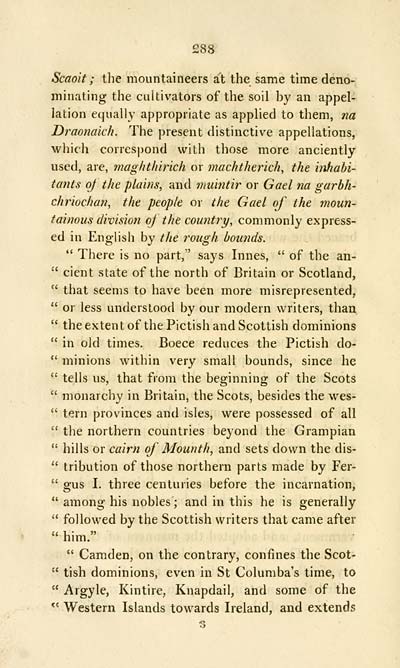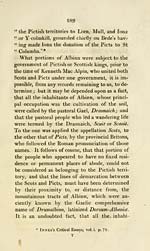Download files
Complete book:
Individual page:
Thumbnail gallery: Grid view | List view

J88
Scaoit ; the mountaineers at the same time deno-
minating the cultivators of the soil by an appel-
lation equally appropriate as applied to them, na
Draonakh. The present distinctive appellations,
which correspond with those more anciently
used, are, maghthirich or machtherich, the inhabi-
tants oj the plains, and muititir or Gael na garbh-
chriochan, the people or the Gael of the moun-
tainous division of the country, commonly express-
ed in English by the rough bounds.
" There is no part," says Innes, " of the an-
" cient state of the north of Britain or Scotland,
" that seems to have been more misrepresented,
" or less understood by our modern writers, than
" the extent of the Pictish and Scottish dominions
" in old times. Boece reduces the Pictish do-
" minions within very small bounds, since he
" tells us, that from the beginning of the Scots
" monarchy in Britain, the Scots, besides the wes-
" tern provinces and isles, were possessed of all
" the northern countries beyond the Grampian
" hills or cairn of Mount h, and sets down the dis-
" tribution of those northern parts made by Fer-
" gus I. three centuries before the incarnation,
" among his nobles; and in this he is generally
" followed by the Scottish writers that came after
"him."
" Camden, on the contrary, confines the Scot-
" tish dominions, even in St Columba's time, to
" Argyle, Kintire, Knapdail, and some of the
*' Western Islands towards Ireland, and extends
3
Scaoit ; the mountaineers at the same time deno-
minating the cultivators of the soil by an appel-
lation equally appropriate as applied to them, na
Draonakh. The present distinctive appellations,
which correspond with those more anciently
used, are, maghthirich or machtherich, the inhabi-
tants oj the plains, and muititir or Gael na garbh-
chriochan, the people or the Gael of the moun-
tainous division of the country, commonly express-
ed in English by the rough bounds.
" There is no part," says Innes, " of the an-
" cient state of the north of Britain or Scotland,
" that seems to have been more misrepresented,
" or less understood by our modern writers, than
" the extent of the Pictish and Scottish dominions
" in old times. Boece reduces the Pictish do-
" minions within very small bounds, since he
" tells us, that from the beginning of the Scots
" monarchy in Britain, the Scots, besides the wes-
" tern provinces and isles, were possessed of all
" the northern countries beyond the Grampian
" hills or cairn of Mount h, and sets down the dis-
" tribution of those northern parts made by Fer-
" gus I. three centuries before the incarnation,
" among his nobles; and in this he is generally
" followed by the Scottish writers that came after
"him."
" Camden, on the contrary, confines the Scot-
" tish dominions, even in St Columba's time, to
" Argyle, Kintire, Knapdail, and some of the
*' Western Islands towards Ireland, and extends
3
Set display mode to: Large image | Transcription
Images and transcriptions on this page, including medium image downloads, may be used under the Creative Commons Attribution 4.0 International Licence unless otherwise stated. ![]()
| Early Gaelic Book Collections > Ossian Collection > Thoughts on the origin and descent of the Gael > (300) |
|---|
| Permanent URL | https://digital.nls.uk/82238044 |
|---|
| Description | Selected books from the Ossian Collection of 327 volumes, originally assembled by J. Norman Methven of Perth. Different editions and translations of James MacPherson's epic poem 'Ossian', some with a map of the 'Kingdom of Connor'. Also secondary material relating to Ossianic poetry and the Ossian controversy. |
|---|
| Description | Selected items from five 'Special and Named Printed Collections'. Includes books in Gaelic and other Celtic languages, works about the Gaels, their languages, literature, culture and history. |
|---|

